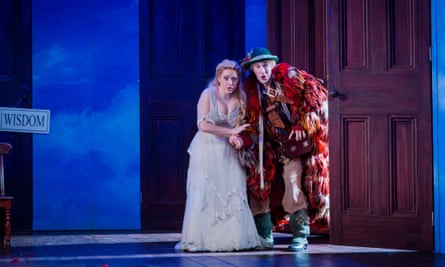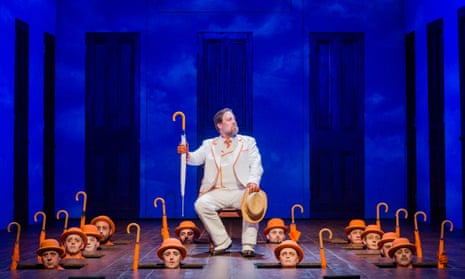Dominic Cooke’s staging of Mozart’s Singspiel for Welsh National Opera was first seen in 2005; this latest revival now takes its place in the company’s themed spring season, Spellbound. On the whole, Cooke and designer Julian Crouch’s surrealist take has worn well. The orange-suited and bowler-hatted men of Sarastro’s brotherhood and the sly visual references to Magritte, Max Ernst and Dalí – clouds in blue sky, birdmen, lobsters – sit comfortably enough with Emanuel Schikaneder’s mix of fairytale and masonic ritual.
Mozart’s music never fails to work its magic, yet, not for the first time, delivery of Jeremy Sams’s English dialogue is a stumbling block: added slapstick and less-than-sparkling projection and comic timing often underlines the libretto’s sexism and misogyny. Monostatos may no longer be blacked up, but his sexual predation of Pamina – where’s the harm of it, he asks – is chilling. The myriad accents add other unintended inflections. Surprisingly, the usually charismatic Jacques Imbrailo was an awkward Papageno, straight off the South African veldt, and audibly relieved when bursting into song rather than acting and clowning.

As Tamino, tenor Allan Clayton’s speaking voice was the most effective and his tone, though initially too beefy, melded well with the luscious sound of Sophie Bevan’s Pamina. Bevan is a worthy successor to Rebecca Evans in this production. As Queen of the Night, Samantha Hay made a laboured start, but upped her game to match the high tessitura, while Scott Wilde’s Sarastro had a stentorian boom. Lothar Koenigs’s score was quite brisk, occasionally losing Mozartian grace, while the wise innocence of the three boys is lost when the roles are taken by older girls, albeit singing well. So not entirely spellbinding.

Comments (…)
Sign in or create your Guardian account to join the discussion